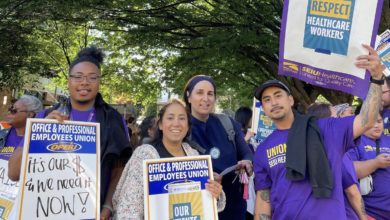A people’s movement in the Bay Area has
succeeded in forcing a hospital to reverse its refusal to perform a
kidney transplant on an undocumented worker, Jesus Navarro, because
of his immigration status. Navarro’s struggle illustrates the
inhumanity of a for-profit health care system, as well as the racist
nature of capitalism.
Navarro, 35, has been living in the
United States for 16 years and has worked at Pacific Steel in
Berkeley, Calif., for 14 years. His kidneys began to shut down in
2004, but Navarro continued to work for Pacific Steel in order to
help support himself and his wife, Alicia, by performing his own
dialysis at home. As difficult as his situation was, Navarro believed
that if he could get a kidney transplant he would enjoy a normal
life.
He had a union job, and private
insurance to pay for the operation as well as the expensive drugs
that would allow his body to accept the new organ after the
transplant. Without a transplant, Navarro knew he would probably die
in his 30s. He waited on the transplant list for years.
In the spring of 2011, Navarro learned
that he had moved to the top of the transplant list. In May, he went
to the University of California-San Francisco Kidney Transplant
Center to prepare for the operation. Instead, doctors interrogated
Navarro about his immigration status. He acknowledged that he was
undocumented, not thinking it could affect his health insurance.
The doctors told Jesus and Alicia that
the hospital would not perform a transplant operation on an
undocumented worker. Alicia offered her own kidney for the
transplant, and even though it turned out that she and her husband
were a tissue-match, the hospital refused to consider performing the
operation that could save Navarro’s life.
Why would the hospital do this? It
would seem to make no sense even according to the ruthlessly inhumane
rules of capitalism. Navarro, after all, was fully insured. The
hospital and the drug companies had every reason to believe that they
would profit by treating Navarro.
In an astoundingly candid response,
Reece Fawley, executive director of transplantation at UCSF,
explained that the hospital evaluates its patients for “socioeconomic
stability.” In other words, for UCSF to save a life in situations
like Navarro’s when there would be continued care after the
operation, the patient must not only have insurance, but it must
appear to UCSF that there is no likelihood that the patient would
lose his job and/or insurance, so as to assure that the hospital
would not have to lose money on the continued care of the patient.
Of course, under capitalism, anyone can
lose their job and insurance, but some groups, such as
African-Americans, Latinos and, in particular, the undocumented, are
much more likely to do so. Jesus Navarro, despite having held a
steady job and being insured for 14 years, was thus not
“socioeconomically stable” enough for UCSF to warrant a
life-saving operation, due to being undocumented. In a grotesquely
ironic twist, Navarro would soon lose his job due to his immigration
status.
Back in March 2011, workers at Pacific
Steel went on strike when the owners tried to make the workers pay
part of the costs for their health plans. The strike, led by Local
164B of the Glass, Molders, Pottery, Plastics and Allied Workers
International Union, not only defeated the co-pays called for by the
owners, but won the workers a $3.78 an hour raise.
The owners of Pacific Steel needed to
put the workers back on the defensive. In January of 2012, the
company performed an immigration audit of its largely Latino
workforce. Two-hundred employees, including Navarro, were terminated
due to their immigration status.
Community organizers rallied around
Navarro’s cause since an article about his predicament was published
in the San Jose Mercury News on Jan. 30. .In a major
victory, he was allowed to retain his private medical coverage.
Several medical organizations, such as
the California Nurses Association, signed a letter to UCSF demanding
that the hospital perform Navarro’s surgery and pay for his
post-operation expenses, if necessary. Many UCSF medical students
started pressuring the administration to reverse its decision. An
online petition to UCSF drew tens of thousands of signatures.
Due to unrelenting public pressure,
UCSF issued a statement on Feb. 9, agreeing to perform the
transplant on Navarro. The hospital characterized Navarro’s plight as
a “misunderstanding.”
This is not an isolated case. Many
undocumented workers have been denied medical services they
desperately need. Even though it currently appears that Navarro will
receive the transplant, his case is demonstrative of the criminality
of capitalism. The fact that popular outrage forced a large
capitalist institution to reverse its inhuman policy demonstrates
that the people have the power to fight successfully against this
system.





